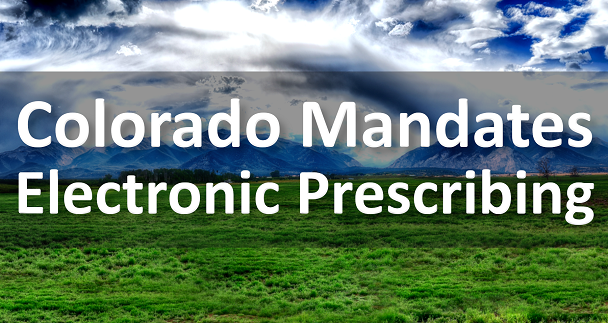
Colorado Governor Jared Polis recently signed SB079 into law. This Act mandates Colorado healthcare providers to electronically prescribe controlled substances that are scheduled as II-IV with an effective date of either July 1st, 2021, or July 1st 2023. The Act breaks down the medical field to several categories of healthcare providers: podiatrists, dentists, optometrists, advanced practice nurses, physicians, and physician assistants. For each practitioner category there is a provision for those who are practicing in a rural area of the state or are a sole-practitioner to postpone the mandate from July 1st 2021 to July 1st 2023. Dentists are mandated for EPCS by July 1, 2023 regardless of if they serve a rural or urban community.
Other subsections of this Act include:
- The act contains provisions for a waiver to using EPCS as many State Mandate laws do, however Colorado allows for practitioners who write less than 25 prescriptions for controlled substances per year to not have to adopt electronic prescribing.
- Prescribers are required to indicate on their license renewal whether they have complied with the EPCS mandate.
- Pharmacies are not required to verify if a controlled substance prescription received via written, oral, or fax falls within the state and federal laws.
Colorado has remained slightly above the national average for opioid-related overdose deaths since 1999, following the national trend and increasing in number of deaths. The rate then flattened in 2015 and 2016, falling below the national trend. Heroin related deaths have been climbing; however, prescription opioid deaths have been slightly declining in recent years.
Several legislative initiatives have been enacted as Colorado continues the fight against the opioid epidemic. In 2017, the general assembly enacted Senate Bill 17-074, which created a 2-year medication-assisted treatment (MAT) expansion pilot program, administered by the university of Colorado college of nursing, to expand access to medication-assisted treatment to opioid-dependent patients in Pueblo and Routt counties. The 2017 Act directs the general assembly to appropriate $500,000 per year for the 2017-18 and 2018-19 fiscal years from the marijuana tax cash fund to the university of Colorado board of regents, for allocation to the college of nursing to implement the pilot program. The pilot program repeals on June 30, 2020.[1] Currently, Senate Bill 19-001 is under consideration to expand and continue the MAT in future years. Colorado also passed Senate Bill 18-022 in 2018, which limits the quantity of opioids that a patient can receive.
Colorado currently has a 31.7% provider enablement for electronic prescribing of controlled substances, which is just below the national average of 33.4%. Pharmacy enablement for EPCS is 97.4% which is above the current nation average for pharmacies, which is 95.2%.[2] There will likely be a big push leading up to 2021 to secure electronic prescribing, MDToolbox encourages providers not to wait!
Colorado now aligns with several other states mandating electronic prescribing. MDToolbox looks forward to working with providers throughout Colorado to ease the transition and help provide tools and resources in combating the opioid epidemic. With MDToolbox providers have access to tools such as Electronic Prescribing of Controlled Substances (EPCS) and convenient on the go mobile e-prescribing. Contact us for more information or to start your free 30 day free trial.